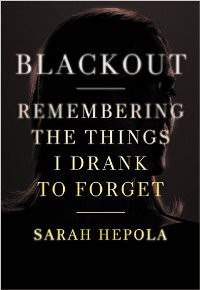The Anatomy of a Blackout

By Kelly F.
Originally published on August 11, 2015, on The Adventures of a Sober Senorita.
If you haven’t heard of the book, Blackout: Remembering the Things I Drank To Forget, by Sarah Hepola yet, you’ve most likely been living under a rock. She has been on all of my favorite recovery podcasts, blog sites, and news sites, (even CNN and NPR!) and I’m not surprised because her book is just as good as all the hype it got.
Not only is her storytelling ability and candidness refreshing and captivating, her story is one I can 100% relate to. I found myself thinking at several points in the book, wow, it’s like she is taking thoughts out of my brain and writing them in this book. I literally couldn’t put the book down. I kept thinking she is me, I am her, we are the same person.
Our most notable similarity is the way we used to drink: full-on, time losing, lights out blackouts. Her precise accuracy in describing the feelings of a blackout touched so close to home that it brought up a lot of painful flashbacks for me. I’m glad Sarah has brought the discussion of blackouts to the forefront.
When I was drinking I thought everyone blacked out. I thought it was normal, until my friends started telling me they never blacked out like I did. When I was so often left piecing together the night before, my friends were the first people I would ask, “What happened last night? We went where?” They would say, “You really don’t remember ANYTHING?” They thought it was impossible that I could have lost hours of my life without so much as a flash of what occurred. Let me tell you, coming out of a blackout or waking up the next morning has got to be the worst feeling in the world.
Blackout Defined

Published on June 23 of this year, it is already a New York Times bestseller and is available on Amazon, where it has received 165 customer reviews. Click on the image to see it on Amazon.
The National Institute on Alcohol Abuse and Alcoholism (NIAA) defines a blackout as a period of amnesia during which a person actively engages in behaviors but does not create memories for these events as they transpire. All blackouts are not created equal and they are generally distinguished according to the amount of amnesia experienced. The most common form of blackouts are the spotty nights where you can remember some parts, but not all events that occurred. These are known as “brownouts.” Your night may seem a little foggy and then someone says something about your night that may trigger some of your memories. This works for some people, but not all.
The type of blackouts Sarah Hepola and I experienced are known as en bloc blackouts – full and complete amnesia often spanning hours or more. Trying to recall memories from these types of blackouts is futile.
When and Why Blackouts Occur
The reason memories from an en bloc blackout cannot be recalled, no matter how hard we try, is because the memories were never formed in the first place, so no amount of digging will make them appear. Blackouts occur when alcohol turns off brain circuits that involve the part of the brain known as the hippocampus. One of the responsibilities of the hippocampus is to consolidate memories from our day-to-day lives. Information enters our brain and is processed in many different areas, then funneled into the hippocampus, which organizes the information into a constantly updated record of facts and events in our lives. Alcohol interferes with this system and thus, a void in the record-keeping is created.
So, why are people who are blacked out able to talk, walk, have sex, or do anything else like a normal person? During a blackout, the ability to remember things from before the blackout is possible, therefore a person can carry on a conversation or tell a story from years before or even from the night of their blackout while they were intoxicated but not yet blacked out. This is why it’s hard for outsiders to tell if someone is in a blackout or not. Typically there are no definite signs. Depending on the chemical makeup of a person, how much they drank, and how impaired their brain functions are, a person who is in a blackout can appear visibly intoxicated or not intoxicated at all. Anything a person does during everyday life, a person can do while blacked out, they just won’t remember it the next day, or whenever they come to.
What Puts You at a Greater Risk For a Blackout
The NIAA says research points to several factors that increase a person’s tendency to blackout while drinking.
- Drinking in ways that would cause your blood alcohol level to rise quickly and reach a high level. This can be achieved by drinking a large quantity very fast.
- Being female.
- Genetic sensitivity to blackouts.
- If you’ve blacked out before, there’s a good chance you’ll black out again.
Blackouts – The Scariest Part About Drinking
To this day, it still gives me a sick feeling in my stomach that there are so many hours of my life that are unaccounted for. Situations where I took part in sexual acts I would not have given consent to had I been alert and sober, drugs I took without knowing what I was doing, and times where I still have no idea what happened, and I never will. To this day, it has been one of the hardest parts about my sobriety – coming to terms with these facts, accepting them, and letting them go. Scary, that I experienced these blackout periods and continued to drink for so long. Scary that people around the world may think that blackouts are normal. They aren’t. They are the scariest part about drinking.


























I must read this book. I recall clearly the waking up terror of impending doom. Where did I go? Is my car outside? Why is my face bruised? I remember back in my early 20’s my worst blackouts were when I combined hard liquor with marijuana. Blissful la la land followed by no memory. Can’t believe I survived.
Why do I have this bruise on my forehead?
Thanks for the essay. For many years I clung to the fact that I did not black out as “proof” that I was not alcoholic. I was wrong. People who have blackouts early on are people who are actively demonstrating one of the factors that make us alcoholic – our ability in our own brains to actually shut off parts of itself while continuing to allow apparently normal function. Practice makes perfect, they say and I think I lost control over whole portions of my brain function as drinking went from a recreational thing to a requirement. Anyway with the help of the people in AA – and others – I live to tell about it.
It has long been my belief that the entire phenomena of alcohol and addiction takes place in certain parts of my brain. Most physical effects wear off after a relatively short period of time but I still picture my brain as a place with long empty corridors littered by skeletons, garbage, other debris with incomprehensible graffiti on the walls. Here and there are doorways, boarded up with scorch marks all around the door frames. The place smells like a tavern on Sunday morning.
Anyway. Thanks for the good read. Dan L.
Thx for the article today. Thank you aaagnostica for providing this place for so many of us to come together. & thank you for my sobriety & learning the courage to deal with the shame which has resulted from more than 100 blackouts from nearly 2 decades of drinking. What an extraordinary thing it is to be able to Love again.
Excellent article on blackouts. I would like to reprint this in our local AA Hernando County newsletter, the Communique. Please let me know.
Steve T.
Communique editor
“It’s hard for outsiders to tell if someone is in a blackout or not.” I would like to read this book but for now, just a comment on the above statement from the review. The statement is so true. As one who works often with wet drunks, I can tell you that I have talked to people many times on the phone who swear they have not been drinking and their speech and conversation many times certainly make it appear that they are telling the truth. Sometimes it is useful to know whether they are in a blackout. I learned a trick from a source which I cannot remember (no pun) in recovery literature: To determine whether they are in a blackout, ask them to remember a list of three nonsensical items. Then, a few minutes later, ask them to list those items. If, they cannot, there is a good chance they are in a blackout and will not remember any wisdom you attempt to impart to them so I usually tell them to go to bed and call me in the morning.
I had both brown-outs and blackouts. First time I realized I had had a blackout, we had had wine with dinner and drinks after, in the living room, before going to bed on the 2nd floor to make love. In the morning, I remembered nothing past drinks in the living room. I listened carefully for clues, and heard my husband whistling, so I sighed in relief. I was never able to think of a cool way to ask, “Did we have fun last night?”
The only way to know if you are drinking into a blackout, obviously, is to wake up the next day and remember/not remember.
I got to remember most of the embarrassing things I did, rarely blacked out. Aside from a few brownouts and a few minor blackouts such as unremembered 3 am phone calls, I only know of one major instance where I came to on the way BACK across the bay bridge, not knowing anything that had passed, where I had been, though most likely at the usual peep show when I was drunk and lonely. But it was scary, though I guess some twisted comfort lies in the fact that we ARE able to function. I know of one instance where a woman drove her kids to a hotel a couple of hundred miles away, and came to after she had been there two days. “Obviously” she got them all there safely. Scary. My favorite story is of a friend who was some early computer big shot something or other, who came to in the middle of giving a speech to a good size group of people. And said to himself “Who are these people, and what am I talking to them about?” Scary.
I was always envious that I had to remember everything and they didn’t. Scary.